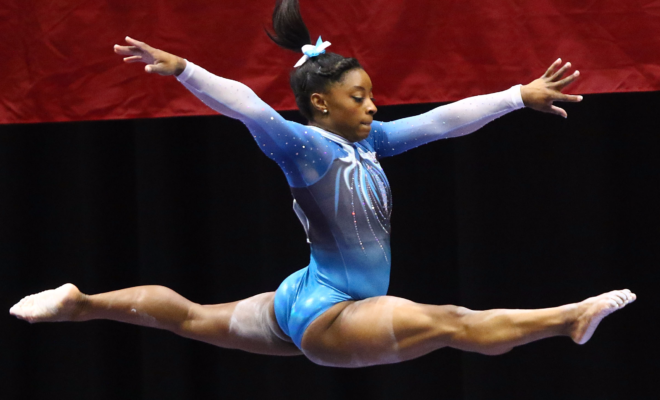
Honors/Awards
Boorman, Zmeskal-Burdette Receive U.S.O.C. Coaching Honors
By Scott Bregman
One guided the most decorated U.S. gymnast in history to a string of three World all-around titles and the Olympic all-around gold. coaching
The other – who happened to make history for Team USA 26 years ago, winning the U.S.’s first-ever World all-around title – has coached six women to the senior national team, eight to the junior team and 23 to the Junior Olympic national team.
And, today, the U.S. Olympic Committee honors both for their coaching accomplishments: Aimee Boorman as U.S. Olympic Committee Co-Coach of the Year and Kim Zmeskal-Burdette as U.S. Olympic Committee Developmental Coach of the Year. The awards are the first for a gymnastics coach in the awards’ 20-year history.
“It’s an amazing honor. I have been nominated before – and that was very exciting. But this year, it feels so special being an Olympic year,” Boorman said of the award. “It’s a recognition that you can produce a holistic athlete to where you’re enriching every part of their life, you’re not just teaching them gymnastics.”

© John Cheng
Zmeskal-Burdette echoed Boorman, saying, “It’s a huge honor any time I can be a positive representative of our sport, the sport I’m super passionate about and that I love. I certainly think that it’s a team effort, that everyone pushes and encourages everybody to be a little better.”
“Both Aimee and Kim are incredible representatives of USA Gymnastics,” said Rhonda Faehn, USA Gymnastics senior vice president of women’s gymnastics. “I’ve been able to witness firsthand how they coach, their styles and philosophies, and it is amazing to watch them work and connect with young athletes.”

© John Cheng
“We learn from one another.”
“I love that she has her genuine happiness toward being part of this amazing, great thing,” Zmeskal-Burdette said of Boorman. “She allowed Simone to have an ownership in what she’s doing – which is ultimately the goal of any great coach, for the athlete to start running the show because they know what to do and they want it with all they are – I think she’s been an amazing example of that.”
Likewise, Boorman said she admires Zmeskal-Burdette’s focus on the individual, saying that the two agree on developing the whole athlete, not just the gymnast.
“I really think that Kim’s trying very hard to produce a whole athlete and somebody who’s healthy when they come out of it,” said Boorman. “Kim and I see eye-to-eye on a lot of things about that and about appreciating the athletes for who they are and what they’re choosing to bring to the table.”
Zmeskal-Burdette credits the relationships between fellow coaches within the U.S. system, where coaches work closely together year-round for national team and developmental camps and at international assignments, for much of the success of the women’s program over nearly the last two decades.
“We learn from one another. Sometimes, it feels like you’re stealing from each other,” Zmeskal-Burdette added with a laugh. “Whether it’s an amazing skill or combination, or even just watching what the different reactions are from coaches, how different relationships work. We are definitely the team that we are because of having that great mixture.”

© John Cheng
“It’s just gymnastics.” coaching
That’s how Boorman, the 2016 U.S. women’s Olympic head coach and long-time coach of four-time Olympic gold medalist Simone Biles, described her coaching outlook.
“We coach to teach children life skills and how to deal with adversity and success and hard work and to be able to reap the benefits and rewards of that hard work,” she continued. “But, ultimately, you know, they’re children and human beings first.”
It’s a philosophy that helped Boorman, who moved to Sarasota, FL, after the Olympics to join EVO Athletics, guide her star pupil through tough times like a meltdown performance at the 2013 U.S. Classic, a 2014 shoulder injury that kept her out of competition much of the year, and increasing pressure as Biles geared up for her historic third-straight World all-around title and her medal-winning run in Rio.
“People need to understand that Simone is a human,” Boorman reiterated, “and even though she seems supernatural when she does gymnastics, she goes through the same mental struggles as everyone.”
Struggles, Boorman says, she was prepared for by making sure she opens the lines of communication with all her athletes from the beginning.
“Any athlete that I’m coaching, I encourage them to communicate. I want to know if they’re hurting, if they’re injured,” said Boorman. “They’re going to have good days, they’re going to have bad days. And I feel like as a coach, you need to know how to adjust your training to that… because recognizing and finding the way to get the best out of the athlete for that day is more important than what your lesson plan was.”
Boorman’s focus on communication and getting the best out of Biles each day in practice did not go unnoticed.
“It was wonderful to be able to see just the incredible trust and communication that Aimee had with Simone,” said Faehn. “She just knew that what was important for another athlete on the team, that might not be what was necessary for Simone. I really respect her not only for knowing the athlete so well, but also for standing her ground. She was going to do her ultimate to make sure Simone was prepared.”
“She’s accommodated for me,” Biles told USA Gymnastics in a 2015 interview. “She knows what I need, and that I can’t do such high numbers.”
A legend in the making
Biles got started in the sport at the age of 6, after her parents noticed she was “hyperactive.” On a field trip to a gym, Boorman’s mom, Ronnie, first noticed Biles performing round-off back handsprings on the trampoline, a move her brother taught her in the backyard. A week later, Boorman connected with Biles, forming a bond that would take the duo to heights never before seen in U.S. gymnastics history.
As the pressure and media attention mounted in last year’s high-pressure Olympic year, Boorman worked with Biles on how she approached competition and training, pushing away other people’s expectations as just that: other people’s expectations.
“I think the biggest thing I said to her was, ‘People’s expectations are their problems, you are not responsible for their expectations,’” Boorman said.
“Simone was told all along the way by her parents, by me, by her other coaches, if you don’t want to do this, you don’t have to do this,” added Boorman. “It’s not who you are, it is what you do. You do gymnastics, you are not a gymnast. You are Simone.
“And I tell all my athletes the same thing.”

© John Cheng
Biggest letdown…a blessing in disguise
“Going into an Olympics as current World all-around champion, obviously, I had my sights set on a different outcome,” Zmeskal-Burdette candidly admitted. “But, in hindsight, I feel like that has propelled my life into what it is, almost every piece of it.”
Zmeskal-Burdette, the 1991 World all-around champion and 1992 World balance beam and floor exercise champion, was considered a favorite for all-around gold at the 1992 Olympic Games in Barcelona. Her 39.687 in the team optionals round, the highest score that day, helped Team USA to its first women’s team medal in a non-boycotted Games since 1948, but a stress fracture in her ankle hampered her performance in the all-around final where she finished 10th.
“I sincerely don’t think I would be coaching had things gone differently. I don’t know if I would have met my husband,” Zmeskal-Burdette said. “I really try to hold that perspective with the girls that I coach.”
“You can feel like you’re going after one thing, but it’s not really just the one thing,” she added. “I think that’s beautiful because that makes it so that careers are not just about what society sometimes feels like is the most important, which is just who is going to win.”
She and husband Chris Burdette opened Texas Dreams Gymnastics in Coppell, Texas, in 2001. Shortly thereafter, the duo emerged as a national force. In 2003, they guided Tiffany Tolnay and Brittany Magee to the Junior Olympic National Team. Both would go on to be collegiate standouts. Magee, senior, and Meghan Blair, junior, were Zmeskal-Burdette’s first athletes to make the U.S. National Team in 2004.
Zmeskal-Burdette has guided 23 women to the Junior Olympic Team, eight to the junior national team and six to the senior national team. She has had a member of the junior national team consecutively since 2010 and the senior team since 2012.
“There is no perfect career. It’s a life,” said Zmeskal-Burdette. “I haven’t met many people who can go through a career and feel like there’s not just one other thing that they wish they would have had, but they become the person who ‘could’ no matter what.
“That’s the real success.”
Source: usagym.org







You must be logged in to post a comment Login